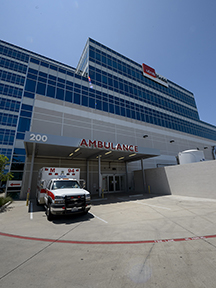
UTMB Health is working to develop one of the largest, most comprehensive trauma networks in the region, and recent developments at UTMB's Clear Lake Campus (CLC) are bringing the institution closer to that goal.
CLC’s trauma center has recently earned Level 3 designation, defined by the American College of Surgeons as having “resources for the emergency resuscitation, surgery and intensive care of most trauma patients. A Level III center has transfer
agreements with Level I and/or Level II trauma centers that provide back-up resources for the care of exceptionally severe injuries.”
Stephen Jones, CEO of UTMB Health Clear Lake Campus, says CLC’s achievement of Level 3 could not have happened without great partnerships between our UTMB faculty, community physicians and other important regional partners over the last two years.
Now, the campus is launching its trauma program with the addition of four new trauma surgeons: Jennifer Moffett, MD; Michael Norman, MD, FACS; Hoang Pham, MD, FACS; and Frank Welsh, MD, FACS. Advanced practice provider Cheryl Breaux, FNP, APRN, rounds
out the team. This expands the trauma section to eight faculty members covering the Level 1 trauma center at Jennie Sealy Hospital, the Level 3 center at CLC, and League City Hospital.
With a new trauma program in house, there is great potential for collaboration with UTMB’s surgeons in neurosurgery and orthopedics, as well as ER physicians and critical care physicians, to deliver the highest quality patient care.
“With these groups working together, we have an extremely strong, comprehensive, well-coordinated continuum of care structure,” Jones said.
“The goal of the department has been to provide better continuity of care and improved patient safety by centralizing the care of trauma and acute care patients under one umbrella,” said Douglas Tyler, MD, MSHCT, Chair of the Department of
Surgery.
The new trauma team comes to UTMB from private practice, and the members are excited to enhance UTMB’s ability to deliver a vital service to its community, while also appreciating the unique qualities of an academic medical center, like training
residents and engaging with research opportunities.
The surgeons’ patient-centered approach is a natural fit for UTMB. Pham commits to making the patient the main focus of his practice, emphasizing timely service and attention to the needs of those who trust him with their health and lives.
“I want to serve the community in a comprehensive health system while educating the next generation of doctors and nurses,” Pham said. “UTMB was the first medical school in Texas and has been serving Southeast Texas for 130 years. I
am honored to join the Faculty Group Practice.”
Norman has a similar view, stating, “My two principal areas of practice are injured patients and emergency general surgery. If someone is seeing me… they are, by definition, having a bad day. I do what I can to cover what we think is going
on and communicate that as well as treatment options to patients and their families.”
The trauma program at CLC launched in February. With CLC now designated as a Level 3 center, the team will also cover trauma care at UTMB's League City Campus Hospital, which is undergoing the verification process to become a Level 3 center. These locations
will join the Angleton Danbury Campus Hospital, a Level 4 center, and the Level 1 center in Galveston.
Tyler said department leadership has been running virtual morning report, linking all four campuses, daily at 7 a.m. to review all acute care, trauma, and surgery admissions, as well as after-hours surgeries to help optimize patient outcomes.
“It not only gives us the largest trauma network in the region, it also gives us the most coordinated trauma network in the region,” Jones said. “Hospitals and physician practices are coordinating with one goal: to provide the highest
quality trauma care to all of our communities.”